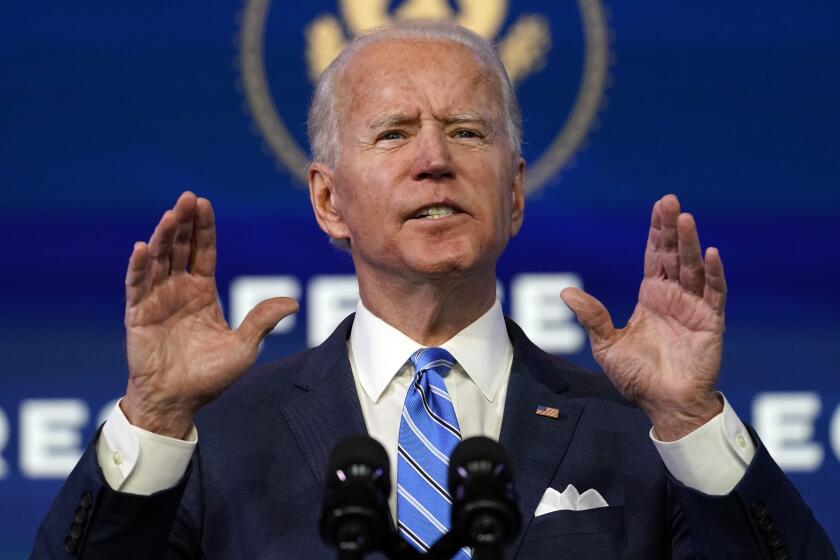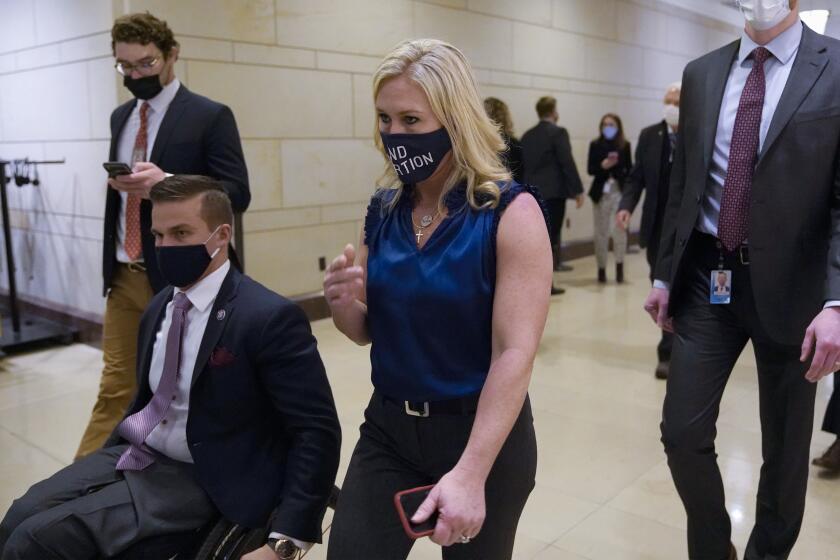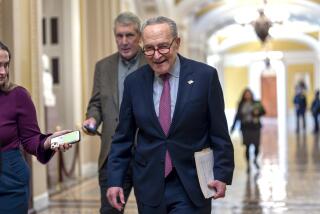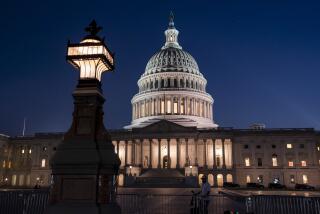Biden meets with House Democrats in push for $1.9-trillion coronavirus relief plan
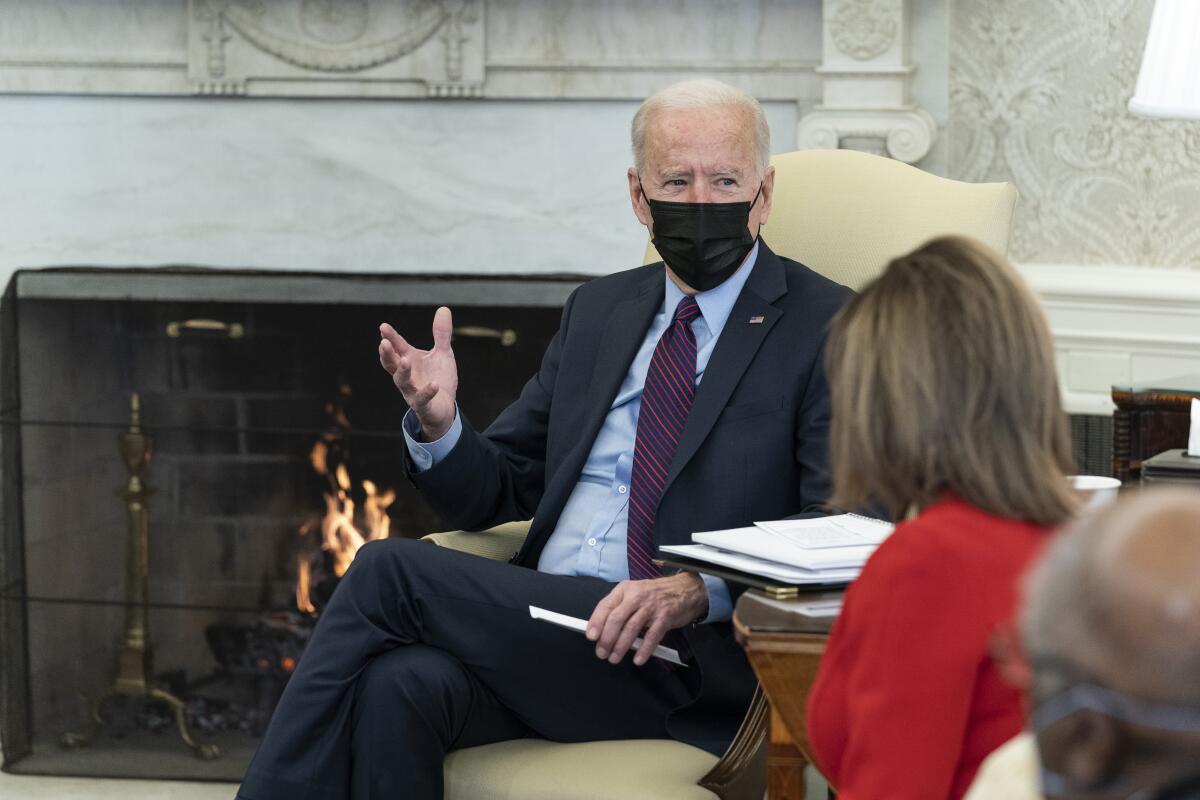
- Share via
WASHINGTON — President Biden met Friday with leading House Democrats who aim to put his $1.9-trillion coronavirus relief package on a fast track to becoming law, drawing on new signs of strain in the economy to push for its approval.
“We can’t do too much here, we can do too little,” he told them. “Real, live people are hurting. And we can fix it. And we can fix it and the irony of all ironies is when we help them, we are also helping our competitive capacity, through the remainder of this decade.”
The Senate early Friday approved a measure that would let Democrats muscle the relief plan through the chamber without Republican support. Vice President Kamala Harris was in the chair to cast the tie-breaking vote, her first.
Senate Democrats applauded after Harris announced the 51-50 vote at around 5:30 a.m. The action came after a grueling all-night session, where senators voted on amendments that could define the contours of the eventual COVID-19 aid bill.
The budget package now returns to the House, where it will probably be approved again Friday to reflect the changes made by the Senate. The measure can then work its way through committees so that additional relief can be finalized by mid-March, when extra unemployment assistance and other pandemic aid expires. It’s an aggressive timeline that will test the ability of the new administration and Congress to deliver.
The push for stimulus comes amid new signs of a weakening U.S. economy. Employers added just 49,000 jobs in January, after cutting 227,000 jobs in December, the Labor Department said Friday. Restaurants, retailers, manufacturers and even the healthcare sector shed workers last month, meaning that private employers accounted for a meager gain of 6,000 jobs last month.
Amid arguments over the relief package, the move against child poverty hasn’t gotten much attention — but its long-term impact would be major.
“At that rate, it’s going to take 10 years until we hit full employment,” Biden said at the meeting with House Democrats. “That’s not hyperbole. That’s a fact.”
The unemployment rate fell to 6.3% from 6.7%, but that was mostly due to a decline in the number of people who were either working or looking for a job — a sign that some people are dropping out of the labor force. The U.S. economy is 9.9 million jobs shy of its pre-pandemic level.
Biden, who has been meeting with lawmakers in recent days to discuss the package, welcomed the leaders of House committees who will be assembling the bill under the budget process known as reconciliation.
Biden also delivered remarks Friday on the economy as he keeps up the pressure on Congress to “act big” on his relief package.
Money for vaccine distributions, direct payments to households, school reopenings and business aid are at stake.
The Senate passed an amendment 99-1 that would prevent the $1,400 in direct checks in Biden’s proposal from going to “upper-income taxpayers.” But the measure, proposed by Sens. Susan Collins (R-Maine) and Joe Manchin (D-W.Va.), is ultimately symbolic and nonbinding and does not specify at what level a person qualifies as upper income.
President Biden and his coronavirus relief plan are broadly popular, thanks to consistent messaging and Republicans consumed with intraparty fights.
The marathon Senate session brought test votes on several Democratic priorities, including a $15-an-hour minimum wage. The Senate by voice vote adopted an amendment from Sen. Joni Ernst (R-Iowa) opposed to raising the wage during the pandemic. Ernst said a wage hike at this time would be “devastating” for small businesses.
None of the amendments to the budget are binding on Democrats as they draft their COVID plan, but passage of a wage increase could prove difficult. Even if a $15 wage can get past procedural challenges in the final bill, passage will require the support from every Democrat in the 50-50 Senate, which could be a tall order.
Sen. Bernie Sanders (I-Vt.), the new chairman of the Senate Budget Committee and a vocal proponent of the wage increase, vowed to press ahead. “We need to end the crisis of starvation wages,” he said.
More to Read
Get the L.A. Times Politics newsletter
Deeply reported insights into legislation, politics and policy from Sacramento, Washington and beyond. In your inbox three times per week.
You may occasionally receive promotional content from the Los Angeles Times.
